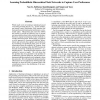Free Online Productivity Tools
i2Speak
i2Symbol
i2OCR
iTex2Img
iWeb2Print
iWeb2Shot
i2Type
iPdf2Split
iPdf2Merge
i2Bopomofo
i2Arabic
i2Style
i2Image
i2PDF
iLatex2Rtf
Sci2ools
106
click to vote
CORR
2010
Springer
2010
Springer
Learning Probabilistic Hierarchical Task Networks to Capture User Preferences
While much work on learning in planning focused on learning domain physics (i.e., action models), and search control knowledge, little attention has been paid towards learning user preferences on desirable plans. Hierarchical task networks (HTN) are known to provide an effective way to encode user prescriptions about what constitute good plans. However, manual construction of these methods is complex and error prone. In this paper, we propose a novel approach to learning probabilistic hierarchical task networks that capture user preferences by examining user-produced plans given no prior information about the methods (in contrast, most prior work on learning within the HTN framework focused on learning "method preconditions"--i.e., domain physics--assuming that the structure of the methods is given as input). We will show that this problem has close parallels to the problem of probabilistic grammar induction, and describe how grammar induction methods can be adapted to learn...
CORR 2010 | Education | Hierarchical Task Networks | Probabilistic Hierarchical Task | User Preferences |
Related Content
| Added | 09 Dec 2010 |
| Updated | 09 Dec 2010 |
| Type | Journal |
| Year | 2010 |
| Where | CORR |
| Authors | Nan Li, William Cushing, Subbarao Kambhampati, Sung Wook Yoon |
Comments (0)

